 |
Chris Bell | 'There are tons of different factors that go into ranking well, but the biggest is high quality content.' |
| - David Sinick |
 |
Chris Bell | 'There are tons of different factors that go into ranking well, but the biggest is high quality content.' |
| - David Sinick |
Bitcoin is decentralized, peer-to-peer, borderless, fast and safe. You're in full control of your Bitcoin, there are ways that it provides a return on investment through forking, and the infrastructure is currently building throughout the entire world. Roger Ver is the founder and CEO of Bitcoin.com, and the cofounder of Bitcoin Cash, and he explains: "Bitcoin is amazingly transformative because it's the first time in the entire history of the world in which anybody can now send or receive any amount of money, with anyone else, anywhere on the planet, without having to ask permission from any bank or government."
The first thing to understand about cryptocurrency is that it's decentralized. If you understand the structure of a relational database management system (RDBMS) of customers and inventory then you understand how companies create a central database for their employees, and sometimes their customers, to make updates to their central server. Then, a few seconds later, the central server has the updated information for users to access and run reports from. Now imagine that you and your friends want to keep track of your golf scores in a Microsoft Excel sheet to review them later. If one person keeps the scores on their desktop, it's centralized. Likewise, if you put the Excel sheet into the cloud for everyone to manage together, it's centralized.

Decentralization happens when each person maintains a copy of the Excel sheet on their personal desktop and each person must confirm every update made. There's no master sheet, instead there are multiple individual copies; one on each desktop. For example, I'm the first golfer to load a score in Row 1. Then my friend plays a round of golf, I add him to Row 2, save it, then send him a copy (image below). Then a 3rd friend plays a round and things start to get interesting. First, I add her name to my sheet in Row 3, then I send a copy to the second person for confirmation, they add her name to their sheet, and finally we send her a third copy of the sheet. This process continues in decentralized databases as it grows. Each copy needs to be exactly the same or the faulty copy will be replaced, and sometimes completely disregarded in the future.
"Decentralization is increasingly coming to be seen as a fundamental democratic principle."
– Larry Diamond (Standford.edu)

Let's say that the third person is manipulative and tries to make a bunch of changes to the posted scores. That's easy to accomplish in an Excel sheet sitting on your desktop. So, when Person 1, Person 2 or a 4th person tries to make a change, the sheet will make its way around to each user to be sure that it's accurate (1-confirmed, 2-confirmed, 3-unconfirmed-disreguard). In this case, Person 1 and 2 will be the consensus (51%+), agree and confirm while Person 3 will have changes that don't match the rest. Person 3 will be kicked out of the group in this case. As the chain of people and entries increases, the amount of security lies in the amount of Excel sheets that match. Every time we add a friend to the Excel sheet, change a score or change anything at all, 51% of the Excel sheets need to agree or the entire system collapses.

Investopedia.com explains a 51% attack on a decentralized database as follows:"51% attack refers to an attack on a blockchain – usually bitcoin's, for which such an attack is still hypothetical – by a group of miners controlling more than 50% of the network's mining hashrate, or computing power. The attackers would be able to prevent new transactions from gaining confirmations, allowing them to halt payments between some or all users. They would also be able to reverse transactions that were completed while they were in control of the network, meaning they could double-spend coins."
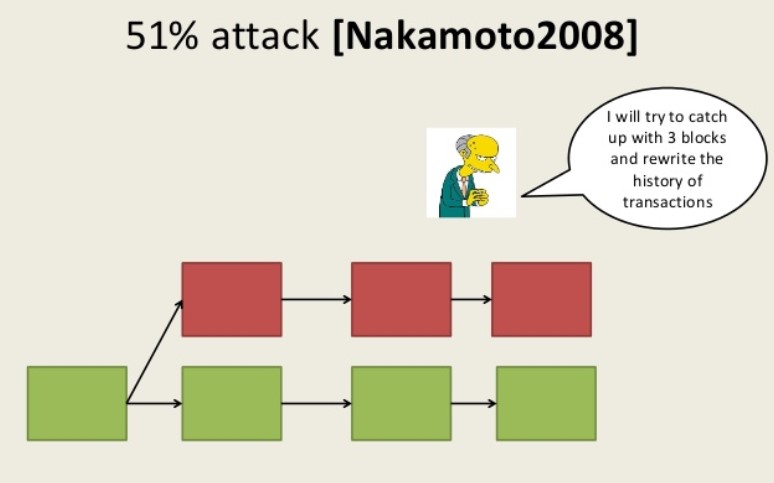
This is an incredibly uncomplicated way to explain how decentralized cryptocurrencies confirm transactions and grow the number of nodes (each Excel sheet is a "node" in Bitcoin) in the network. If every user, or technically 51% of the users, decide to manipulate their node, the entire decentralized database would be corrupted and fail. But if the network of enthusiasts outnumbers the group of hackers and criminals, Bitcoin will carry on while simply disregarding the hackers. In addition to my simple explanation, there are numerous technical attributes to consider such as public and private keys, the fact that bitcoin addresses can only send coins, not pull, that they need a 12-word phrase as a password to send them, and that one-way encryption techniques through secure hashing algorithms create a (so far) impenetrable chain of secured data (money).
Once you understand how databases can be decentralized instead of centralized (everyone maintains a copy), you can see that there's no central authority to maintain the customer's First Name, Last Name, Email or Golf Score. There's no help line, email support or phone support for problems that arise within the database. It either works perfectly or not at all. In other words, when I try to send one Bitcoin to another address (I can only send, not pull from an address) my node will request 6 confirmations from other nodes within the network. If I find 6 nodes that agree with the exact structure of my node (matches perfectly) I'm approved to send the Bitcoin. Then, of course, the entire network of nodes (databases) are all updated BEFORE the next transaction. That way, no one will be able to set up more than one transaction at a time to attempt to sneakily send more coins than they have.

Techterms.com defines a peer-to-peer network as, "In a P2P network, the 'peers' are computer systems which are connected to each other via the Internet. Files can be shared directly between systems on the network without the need of a central server." Each peer holds a node. Each peer can send coins to each peer if each node agrees with the changes and current state of the node. Peer-to-peer is a level format of communication rather than a pyramid hierarchical structure. Peer-to-peer cash systems allow each person to hold cash in their pocket and directly hand it to another peer without any confirmations or approvals from anyone, hence why criminals tend to use peer-to-peer cash systems for their business practices. If you hold your money in a bank you'll need to send a request to the bank to send money to your peer which is peer-to-bank-to-peer, not peer-to-peer.
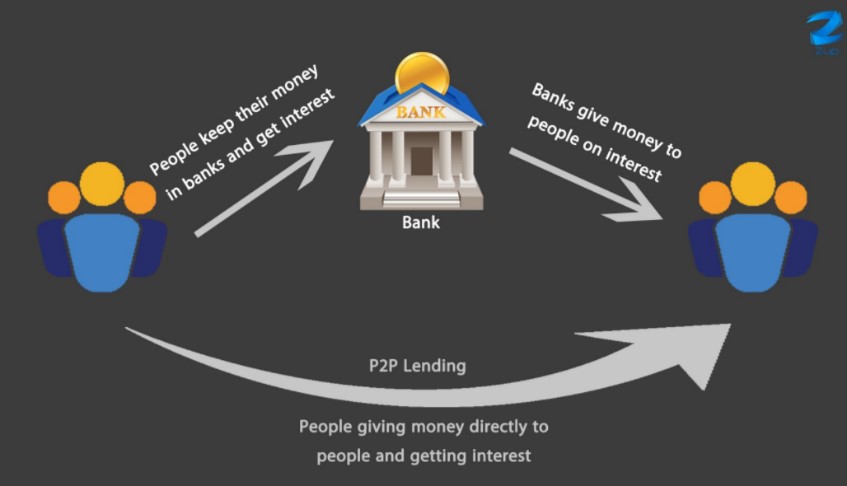
Holding Bitcoin in a hardware wallet is like holding cash in a physical wallet, and walking around with it makes you susceptible to a physical robbery attack. In other words, a person could bully you into sending your coins to them, or any address of their choosing. You could have two hardware wallets, one kept in a safe at home and a few coins on your person to limit the level of robbery possibilities. Or you could throw out your hardware wallet and simply remember the 12-word phrase. Imagine having 10 Bitcoins on a hardware wallet and losing it! The simple solution is to quickly buy another hardware wallet, enter your 12-word phrase and recover your coins. This allows each person to NEVER actually hold bitcoins on them or force them to leave a wallet in a physical safe or safety deposit box. The term "brain wallet" signifies a person that memorizes their 12-word phrase to access their bitcoin address. The address is only accessible and usable with the 12-word phrase and the coins don't technically sit in any physical location that you need to keep secure. Be careful however, because if something happens to your or you develop amnesia, you'll lose your coins and your heirs will never see that portion of your savings. Perhaps, you can give a loved one your 12-word phrase, or perhaps not!
If you live in the United States and have a friend that moved to Canada, you wouldn't be able to easily send them money. However, in the case of Bitcoin, your friend could text or email you a QR code and it would take a few seconds to give them some money in cryptocurrency. Cash is peer-to-peer, and it avoids banks, but cash is also difficult to send to your friend in Canada. Bitcoin is making long distance payments of cash into digital form. Distance and borders are not barriers for Bitcoin, it still acts as easy as a cash system. This is somewhat rare, but you may also be stranded on vacation one day, or attending college in another country where it becomes difficult to transfer money without high fees and a few days of waiting time.
"The really interesting and transformative properties of bitcoin come from the eradication of borders and the elimination of centralization." - Andreas Antonopoulos

Banks are open from about 8am to 5pm Monday through Friday. ATMs and credit cards are typical ways of using cash during the off hours of banks. Payments made on Fridays aren't adjusted in online bank accounts until Monday. I'm sure weekends have caused numerous problems for late rent payments over the past 100 years. When Bitcoin was heavily congested ($20,000 levels) transactions were taking about 30 minutes to one hour to complete, on a Saturday, Sunday or at Midnight on a Tuesday.
Blockchain.info shows an average confirmation time of less than 15 minutes during March (2018) and has a graph that displays the average confirmation times for Bitcoin transactions in minutes: https://blockchain.info/charts/avg-confirmation-time
Credit cards are faster than bitcoin payments which makes it easier for credit cards to be used in stores and quickly approved or denied as a result. Bitcoin payments in stores are more difficult because of the confirmation format in the peer-to-peer system. That doesn't necessarily make Bitcoin inferior. Credit cards preapprove debt to each customer and quickly approve transactions without physically transferring money. You haven't yet paid the credit card bill, you've been loaned money temporarily that you'll be expected to pay back soon. Bitcoin payments are quick and complete within 30 minutes (at the highest levels of congestion) 3-5 minutes at low levels of congestion.
Here's a side note about speed that's important to understand. Bitcoin is the biggest and most expensive coin available in April (2018) which isn't meant for speed. Think of Bitcoin in this sense as the big 18-wheel truck transporting very large loads of money, but slowly. There are other coins built for speed such as Litecoin which is more like a quick, short and direct taxi ride from Point A to Point B. Imagine five years down the road making payments at the supermarket with Litecoin but buying and selling real estate with Bitcoin. These variations of use cases will be determined by the network of people using them, and as the network of cryptocurrencies build traction as an industry. There is currently $115 Billion stored in Bitcoin and $6 Billion stored in Litecoin, so you can imagine how Litecoin is a bit quicker and easier to use for smaller transactions while Bitcoin is the conglomerate but a bit slower.
This is not easy to explain, however there's a big difference between security and encryption. A central database holds personal information and needs to have employees securing it from hackers. The employees at the company know where the entry door (hidden door) is within the big security forcefield. They want to block that door, guard it and stop hackers from coming in, however they need to be able to get in themselves, every morning of every day. Once hackers get in, they can copy data, steal data and sell the data to advertisers and marketers that want to blast emails or create targeted ads online.

Passwords are encrypted. Even when hackers enter through a hidden door into the database, they cannot see passwords that are encrypted. First names, Last names, Emails and other personal data are NOT encrypted through secure hashing algorithms. For example, if my password is "Dude14" it enters into the database as "sha256(Dude14)" which turns "Dude14" into 256 case-sensitive letters, numbers and special characters. Bitcoin addresses are secure because they are encrypted, not because someone build a fancy forcefield around it. The password is surrounded with "sha256()" which stands for Secure Hashing Algorithm and it's a one-way encryption which means the random 256 characters cannot be transferred back to the original password ever, no matter what. Security is different than encryption. Encryption is better than security.
You have control of the cash in your pocket, and you have control of the bitcoin in your public address. Your private key (AKA your 12-word passphrase) unlocks your public address and allows you to send coins to another address of your choice. If your money is in a bank, they have control. Most bank accounts are Federally Insured (FDIC) up to a certain number, and nearly always work just fine. However, there have been problems in the past in relation to banks freezing funds for assorted reasons, and when you have a lot of money you need to start finding other places to store it as a way of diversification in money management.
Cryptocurrencies do not provide or guarantee a return on investment. Investments create income like businesses (dividends), bonds (interest) and real estate (rental income). Gold, Silver and other commodities appreciate and depreciate; however, they don't create dividends, interest or income. They are considered a store of value rather than an investment. For example, I'm not investing in the US Dollar (USD) because I'm holding money in my bank account. Putting my USD into certain savings accounts, Certificates of Deposit or bonds will yield interest (i.e. income) and therefore, a return on my investment.
The easiest example of an investment is real estate. Assume that I buy a piece of real estate at $200,000 and rent it to a tenant for positive cash flow. I also buy some gold for $200,000 and hold both for 10 years. Both values (Home and Gold) go up, down, sideways, up, down and sideways again. After 10 years both the home and the gold are worth exactly what I bought them for; $200,000. I broke even on the gold. However, I made rental income over the years with my real estate. That is the clear difference between a store of value (USD, JPY, Gold, Silver, Bitcoin, Ethereum, etc.) and an investment (Real estate, Toyota, Walmart, Long-term Bonds, Interest-baring savings, etc.)
There's one exception to that when you consider Bitcoin forks and Ethereum airdrops. If you owned 1 Bitcoin at the time when Bitcoin Cash was created (forked) then you automatically got 1 Bitcoin Cash. A different team of developers will be working on the code and upgrades. The catch to claiming your free Bitcoin Cash is that you must use your 12-Word phrase to unlock it since it's a fork of Bitcoin. Your Bitcoin address and the password to unlock it will be recreated into another blockchain. A fork is a snapshot or duplicate of the database along with a different name and blockchain. So, a malicious person might implement a fork to collect 12-word phrases and steal some coins. You'll have to wait for the trust to build or transfer your coins to a different address before claiming the new coins.
The blockchain will flourish and start the foundation for the next level of cryptocurrency infrastructure. Bitcoin's price is synonymous with its network of users like social media websites and dating websites. As more users sign up, the trust gets stronger for the next wave of people to join in. Dating websites weren't an overnight hit. It would be boring to be the only user on Facebook or it could be overwhelming to join the millions. Roads were built over time, wires were hung down streets and computers slowly connected throughout the world, so adoption will increase over the next ten years and have spurts of excitement and hype along the way. Companies will accept cryptocurrencies as payments and they will make the most of blockchain technology to protect their customer's personal information through encryption. The blockchain is a weave of encrypted data (protected) instead of a central database filled with unencrypted personal data.
As companies adopt and approve blockchain technology they help build the infrastructure for Bitcoin too. If companies are adopting blockchain as something that's more secure than what they've been using for years, then Bitcoin is perfect for blockchain because money needs the same if not more security. New companies will emerge like Bitcoin.com, Coinbase and Binance, which are all leading the way and there are millions of developers joining forces with various imaginations and levels of creativity to soon shock us with a new application to play with.
The price fluctuates up and down like the stock market, and the oldest trick in the book is called dollar-cost-averaging, whereby putting equal amounts of monthly funds into bitcoin to average your cost over time. This is opposed to putting your savings in all at the same time, hoping to buy at the lowest point, which is highly risky and impossible to predict. The question isn't how much money do you have to put into Bitcoin, but rather, how much of your monthly income are you willing or able to commit over the next year or two? $10? $100? $1000? Just make sure you can continue averaging your costs by purchasing at the lows, mediums and highs, each month, allowing your mind to rest at ease knowing that you'll buy the next dip as well as the last.
Books I've Read About Bitcoin and Blockchain:
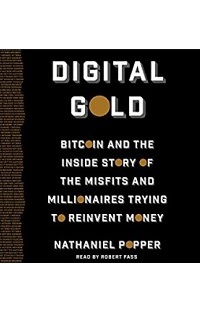 |
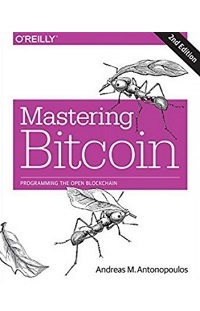 |
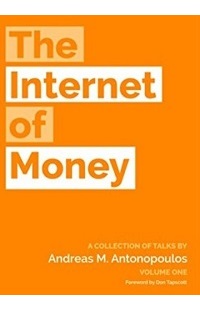 |
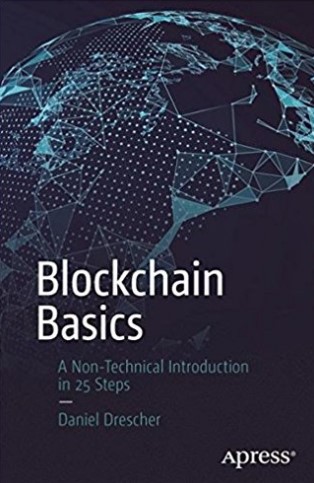 |
Written by: Chris Bell
References:Diamond, L. (2004). Why Decentralize Power in A Democracy? Retrieved from:https://web.stanford.edu/~ldiamond/iraq/Decentralize_Power021204.htm Investopedia.com (n.d.). 51% Attack. Retrieved from: https://www.investopedia.com/terms/1/51-attack.asp Techterms.com (n.d.). P2P. Retrieved from: https://techterms.com/definition/p2p |